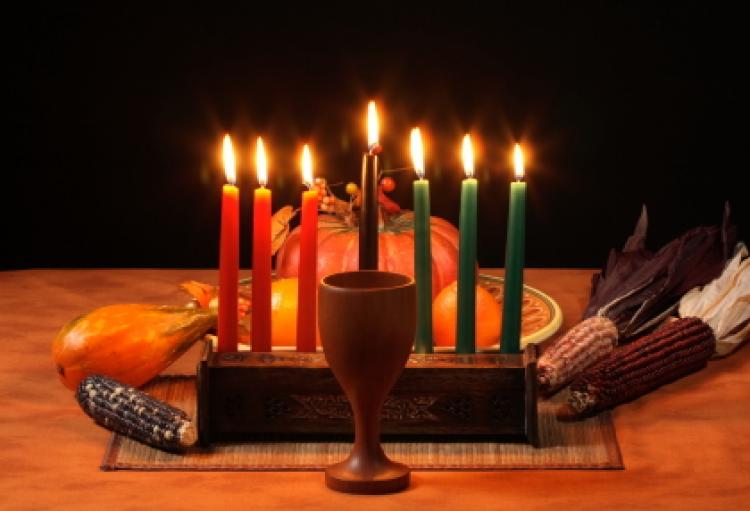This past week has seen multiple holidays. Today's post is going to be about Kwanzaa. If you're looking for a Hanukkah post, I did one last year that you can read here. If you're looking for Christmas posts, I've done three over the years. Whatever you celebrate, I hope you have a lovely holiday season!
So, on to Kwanzaa!
Kwanzaa is an interesting holiday because it isn't associated with any specific religion. Instead, Kwanzaa is a celebration of ethnicity. It has its roots in African culture, but the holiday itself is actually fairly recent. Despite drawing on traditions from many African tribes, including the Zulus and Yorubas, Kwanzaa was invented in 1966. It was a time of racial strife in the United States, with serious riots taking place in LA the summer before. Seeing the troubles of African Americans, an African American professor by the name of Maulana Karenga decided to take action.
Karenga had studied African tribes, their culture, and their customs rather extensively. Many cultures from all around the world have harvest festivals of some sort or another, usually involving a celebration and light. Hinduism has the Diwali festival; a Celtic harvest festival is Samhain. There are so many cultures in Africa that there isn't a single harvest festival, but the many variations on such a holiday all have some things in common. Karenga examined these similarities and came up with the concept for Kwanzaa.
So if Kwanzaa isn't associated with a religion, what exactly is it? Well, it's a celebration of one's roots. Kwanzaa examines the past to strengthen modern ties.
"It is a time to strengthen the bonds among people, just as the harvest was an occasion to gather together, and to give thanks tot he Creator for a bountiful life. It is also a time for African Americans to honor their roots and heritage, and to commemorate the struggles and survival of their people."*
I'm actually very curious to see if there's been an increase in Kwanzaa celebrations in the past several years. At its core, Kwanzaa is an African American celebration, though it has spread to other countries and cultures since its creation. I wonder if the Black Lives Matter movement has increased the number of African Americans celebrants.
If you'd like to read about all of the customs and decorations associated with Kwanzaa, you can visit the official Kwanzaa website here. However, I'd like to sum up a few parts of the holiday.
There are a number of decorations associated with Kwanzaa. Within a house, they're usually all placed on one table to form a display.
Corn, or a bowl of other crops, are traditional to represent the harvest. Ears of corn are also associated with the children of the family. These are placed atop a mat woven out of straw, called a mkeka. A cup is also placed in the display, and is filled each night with a wine which is passed around for everyone to take a sip of.
Corn, or a bowl of other crops, are traditional to represent the harvest. Ears of corn are also associated with the children of the family. These are placed atop a mat woven out of straw, called a mkeka. A cup is also placed in the display, and is filled each night with a wine which is passed around for everyone to take a sip of.
There are three pieces of Kwanzaa which are probably the most integral to the holiday, as well as the most easily recognizable. These are the candles (and their holder, called a kinara), the colors, and the seven principles.
The official colors of Kwanzaa are black, red, and green - the colors of the pan-African flag. Each color represents something important to the African culture. Black represents their skin, and the unity between all Africans. Red stands for struggle and the conflicts that Africans face. Green symbolizes the future, and the hope that is held for it.
There are seven days of Kwanzaa (starting today and running until January 1st), and seven candles. Each candle is associated with one of the seven principles, called the Nguzo Saba. On each day a candle is lit, and the principle with which it is associated is explained.
The black candle is lit on the first day. After that, the candle lighting alternates between the left side (the red candles) and the right (the green candles). Because of this, the lighting ceremony shows that though there are always struggles, hope follows them. I think that's a beautiful message.
Kwanzaa is celebrated in different ways by the many people who celebrate it. Some wear traditional African dress during the seven days of the festival. Others play African music. Many families get together and cook up some African recipes for celebration feasts (because, like many harvest festivals, Kwanzaa has lots of feasting!). Gift giving is also a tradition, though gifts are mostly for the children. Originally Kwanzaa gifts were supposed to be either educational or African in origin, but the holiday has become more generally commercialized in recent years.
I hope this has been an interesting read for you guys! If you celebrate, then Harambee! and happy Kwanzaa!
*Quote from Holiday Symbols and Customs.
Kwanzaa is celebrated in different ways by the many people who celebrate it. Some wear traditional African dress during the seven days of the festival. Others play African music. Many families get together and cook up some African recipes for celebration feasts (because, like many harvest festivals, Kwanzaa has lots of feasting!). Gift giving is also a tradition, though gifts are mostly for the children. Originally Kwanzaa gifts were supposed to be either educational or African in origin, but the holiday has become more generally commercialized in recent years.
I hope this has been an interesting read for you guys! If you celebrate, then Harambee! and happy Kwanzaa!
*Quote from Holiday Symbols and Customs.



No comments:
Post a Comment